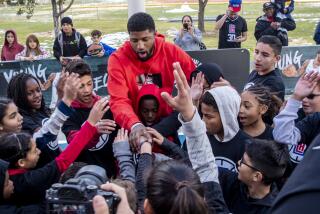WILL TO SURVIVE : Marshall’s Hou Finds Basketball a Breeze After Life in the Killing Fields
- Share via
Hank Hou darts and pivots across the Marshall High basketball court as if part of a choreographed routine. He seems to know precisely when and where other players will move.
Watching Hou spin through the key is like watching a character in an early motion picture who moves at an accelerated, jerky pace. It isn’t always pretty, but it’s effective.
Barrister Coach Henfred Brard estimates Hou is one of the top 5 point guards in the City Section.
“In our league there’s really no one that comes close to him,” Brard said.
But 9 years ago and 8,000 miles from Los Angeles, Hou proved himself under conditions which trivialize the rigors of any sport. Hou survived the Cambodian killing fields, a full-court press that claimed more than a million lives in less than 4 years.
After a recent practice, Hou (pronounced “Who”) sat in the bleachers outside the Marshall gym and curled his hand into a small cup to demonstrate the daily ration of rice he was given by Khmer Rouge soldiers. Sometimes the rice was raw.
In the late 1970s, Cambodia, like much of Southeast Asia, was in chaos. The Communist Khmer Rouge guerrillas, led by Pol Pot, had overthrown the U.S.-backed government of Lon Nol and a period of intense repression followed. Starvation and mass executions were commonplace and hundreds of thousands of people died in labor camps.
Hou, bloated from malnutrition, was adopted by his aunt and uncle, who live in Los Angeles. One of a large number of refugees who fled Cambodia following the Vietnamese Army’s victory over the Khmer Rouge, Hou arrived in the United States in August, 1980.
His parents remained in Cambodia, though, and maintained contact through letters. But after a few years the letters stopped and, Hou says, it is likely his parents died of starvation. Hou speaks of his parents in a quiet, halting voice.
Hou, 17, says he does not remember much about Cambodia. He is also sensitive about relaying the details he does recall because he is concerned his friends will pity him. However, he concedes the experience has made him stronger.
Hou began playing basketball at the Alpine Recreation Center in Chinatown. Tony Wong, an assistant at Alpine, says Hou picked up the game quickly and, after a year, was better than many of his peers who had been playing for 3 or 4 years.
Wong, 32, who coached him in an Asian youth league, said Hou improved rapidly by playing with older boys.
Hou, who still trains with Wong, would often challenge his mentor in endurance contests.
Once he gave Wong a 5-minute head start on a 5-mile run around Silver Lake reservoir. Paced by a friend on a motor scooter, Hou caught Wong and passed him.
“When you’re five minutes ahead, the guy can’t even see you,” Wong said. “He just has great mental toughness.”
Hou, a junior, employs that toughness on the basketball court, where he averages 18 points and 7.5 assists a game for Marshall. The Barristers boast a 13-5 overall record and lead the Northwest League with an 8-1 mark.
Hou, who stands 5 feet, 11 inches and weighs 160 pounds, is physically tough, too. His upper body is lithe but his thighs are thick and heavily muscled. His demeanor is friendly but reserved. Friends say his humble disposition around campus contrasts with that of the stereotypical standout athlete.
That is not to say Hou doesn’t have a commanding presence on the court. In fact, Brard says Marshall’s success is linked to Hou’s performance.
His role in the offensive scheme is twofold. He brings the ball upcourt in the transition game, then posts up at the free-throw line with his back to the basket in the Barristers’ 4-corners set offense.
Because defenders usually opt to double-team him, Hou has learned to find an open teammate in the key for an easy basket. Hou’s specialty is a wrap-around pass that he throws behind a defender’s back.
“He is our catalyst,” Brard said of Hou. “His role is to do it all and he’s done a hell of a job.”
At times, Brard adds, Hou is too unselfish.
“I have to beg him to shoot sometimes,” he said. “He wants to drive and dish off so badly that he’ll pass up an easy jump shot trying to get the ball to a teammate.”
After an early life that was little more than a nightmare, Hou now dreams of playing major-college basketball. But even if that opportunity does not materialize, he counts himself among the fortunate simply to have survived the killing fields.
“I guess I’m pretty lucky,” he said.
More to Read
Go beyond the scoreboard
Get the latest on L.A.'s teams in the daily Sports Report newsletter.
You may occasionally receive promotional content from the Los Angeles Times.










